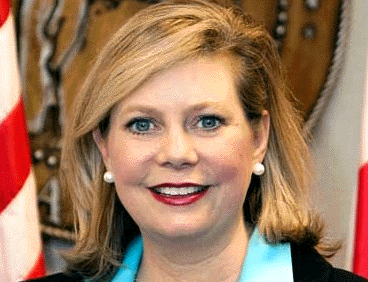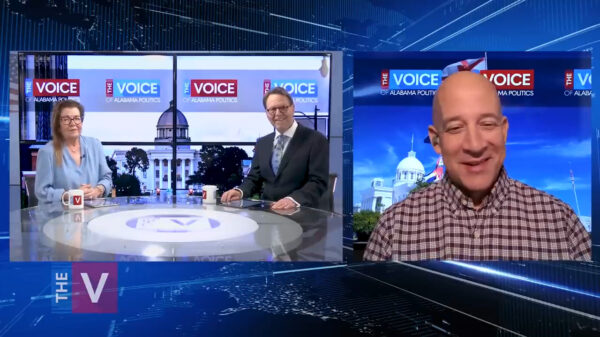By Bill Britt
Alabama Political Reporter
Lately, the Alabama Public Service Commission (PSC) is not just another quiet agency toiling along in obscurity. Recently, the PSC has become a hotbed of controversy as editorial boards, blogs and television news reports have portrayed the division among the commissioners as battle for fair rates for Alabama’s consumers. Here at the Alabama Political Reporter we decided to sit down with each of the commissioners and let them tell their story without hype or spin. Our first interview was with Commission President Twinkle Cavanaugh who spoke with us for over an hour.
The controversy began at the January meeting of the PSC. At the meeting Commissioner Terry Dunn made a motion calling for formal hearings saying he wanted to specifically review the range return on equity for Alabama Power Company, Alabama Gas Corporation and Mobile Gas Service Corporation.
Commission President Twinkle Cavanaugh and Commissioner Jeremy Oden did not offer a second, and Dunn’s motion failed.
This has set off a round of accusations, recrimination and hostility unprecedented for the regulatory agency.
According to Cavanaugh, in December the commission had voted unanimously to hold public hearings looking into all Alabama utilities beginning with Mobile Gas. Mobile Gas was chosen for the first hearing because it contract expires in September.
“A formal hearing is a legal judicial proceeding that is run completely by a legal team of lawyers and a judge,” said Cavanaugh. “A public preceding—which is what we voted on is where everyone can come to the table and everyone can be heard.”
Cavanaugh says there is still an administrative law judge conducting the hearings, “It is very much like what the legislature has when it holds a public hearing, everyone can voice their opinion.”
She likens the difference in public and so-called formal hearings to a divorce, “As long as momma and daddy are talking it may not be perfect because they are getting a divorce but as long as the parents are talking things out the family wins, the children win. As soon as one of the couple says, ‘I tell you what, you talk to my lawyer,’ because you’re angry then the next thing you know the other one has to go hire a lawyer and the two lawyers win, not the family.”
Cavanaugh says she is not ruling out “a legal preceding” but she thinks that the starting point should be public hearings where everyone has input and not just attorneys.
Cavanaugh said that she met with the Attorney General’s consumer advocate division in December and “told them we would be holding these meetings…I said I wanted them prepared and ready to go to advocate on behalf of the consumers.”
PSC does not directly handle the legal aspects of consumer advocacy. That is the purview of the AG’s office.
Recently, Commissioner Dunn has been given a heroic shine because some believe he is advocating for lower rates. But as Cavanaugh points out changing the formula system that is used by the PSC will not automatically translate into consumer savings and could very likely have the opposite effect.
“Before the formula system everything was adversarial,” said Cavanaugh.
In fact before the formula system, every rate question became a costly court battle. So egregious was the process that the State Legislature passed a law sending rate lawsuits directly to the Alabama Supreme Court.
“It [the formula system] is very hard to explain to the public and it’s very easy to demagogue,” said Cavanaugh.
The PSC President then took out a piece of paper and began to diagram how the formula works, using Alabama Power as an example.
She explains that there is a misconception among some that the utilities are guaranteed a return on investment or some other profit scheme.
It is based on return on equity, she says for Alabama Power, “Equity is around 45 percent, their debt is 55 percent,” said Cavanaugh. “They are allowed, not guaranteed, at this point, to earn between 13 and 14.5 percent of their return on equity (ROE). Not the return on company.”
She says when you do the math the company may see around 8 percent ROE, “which is within the southeastern average.”
She also points out that utilities have to be judged on reliability and performance as well as other measures.
Saying that when there are tornadoes, hurricanes and other disasters, Alabama Power is always ready to respond quickly and efficiently to bring customers back on line. “Look, what happen up north with Hurricane Sandy, those people were without power for a long time, that doesn’t happen in our state,” she remarked.
Cavanaugh relates that having stable and reliability power “has play a big part in Alabama’s economic growth allowed us to win ThyssenKrupp, Airbus, Mercedes, Hyundai and all these other companies.”
She continued, “They know at Mercedes if their power goes out that it is a super priority to get it back on.” Cavanaugh says that when there are gas outages or power outages she is notified and monitors every situation. “We are looking at a full picture of a company to regulate them. I want to know when they tell me that they are reliable that I know it for a fact.”
Cavanaugh says she is proud of the work the Commission does but is unhappy with the spectacle that Commissioner Dunn has made. She indicated that Dunn’s motives may be not as pure as have been portrayed by some in the media, but she would prefer to take the high road than engage in the name calling that has become a part of Dunn’s communications with the press.


















































